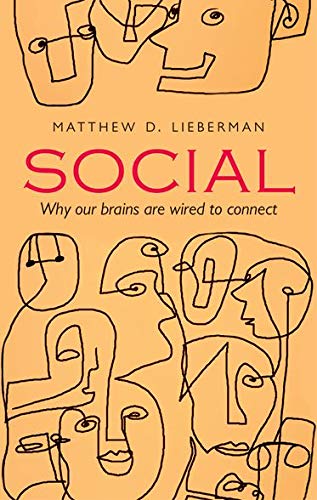Customer Services
Copyright © 2025 Desertcart Holdings Limited
Desert Online General Trading LLC
Dubai, United Arab Emirates


Social: Why our brains are wired to connect
N**A
Best book I have ever read.
Matthew Lieberman’s book is good: it reads well, the structure is helpful and linear for the general-interest reader while also offering some depth for the detail-oriented bookworm or specialist. However, it sometimes overstretches in its interpretation of the brain activity generated in the experiments it considers. This is a classic problem, and the fact that it is starting to be solved within the neuro-science community means that the field is less likely to end up as the phrenology of the 21st century.Lieberman makes clear that there are brain networks primarily in charge of social, self-referential and “mind-wandering” thoughts, and other networks that take care of problem-solving and analytical thinking, and these networks are both considered in building the case for how our brains make us human.And two things for sure make us human: the fact that you can think what the other person thinks that you think (called higher-order theory of mind, and beautifully illustrated by the rock/paper/scissors game), and that we can project ourselves into the future (called long-term planning prediction and anticipation). No other animal can go that far; and the fact that humans created culture means that we have greatly complicated the inferences we can make regarding the evolutionary advantages of specific but complex behaviours such as altruism.This apparently “human-only” characteristic is also well considered here, and it’s worth weighing Lieberman’s hypothesis about why we tend to avoid boasting about helping others and see it as a rewarding thing in itself.Lieberman strikes me as an honest scientist, diligently searching for answers about why we feel pain on a psychological level (the end of a relationship, the death of a parent), or why we feel rewarded by praise or when we give money to strangers.These are not new ideas, but Lieberman, like all original researchers, asks the right questions, looks for the best experiment to do, and tries to answer in light of real neural mechanisms. Classic social scientists are afraid of his kind. He is a threat to all those dark-matter classical psychologists who either backbench from half-dead theories or perform experiments sitting in their black boxes, where the mechanisms of “how behaviour happens” appear to have nothing to do with the workings of the brain.I might not agree with some of the concepts Lieberman crafts from his experiments, but I am pleased that he shows determination in building a mechanistic, brain-grounded account of who we are. And surely one of the uses of this book should be as a spark to think about precisely that.Lieberman the scientist is a firm believer in the theory that we are wired to connect, or, to put it rather better, that we have evolved, through natural selection, to be social animals that thrive now in almost all “ecosystems” using the unique feature of mentalising; and that we cannot avoid thinking, and thinking what the other person is thinking…capisce? He brings the book to a courageous conclusion in his attempt to use “social brain” concepts to guide policymaking. I cannot help but applaud any bid to use scientific evidence to back decisions for learning, business or politics in general. The way we are and how we think must be taken into account when deciding the kind of society we want – and the good news is that it can be based on real research into who we are.
D**O
Insightful, engaging and eye opening. Highly recommend
Brilliant book. Insightful, well-written and very interesting. I bought this book because I was interested in social connection in light of the covid-19 lockdown. In this book, Lieberman explores how we are wired to connect. Social connection is one of our fundamental needs. The book draws on lots of scientific research and yet it helpfully balances academic rigor with an engaging writing style. As someone without a scientific background, I found it very engaging and informative.The evidence in the book is really eye opening. If I'd read this book aged 17 I probably would have studied something different at university!Great read, highly recommend.
A**A
Fabulous read - I love this book
Arrived on time and as described. Fabulous read - I love this book!
R**I
Five Stars
Best researcher on social cognitive neuroscience
A**R
Five Stars
One of the best books on neuroscience I have read
Trustpilot
1 month ago
2 weeks ago